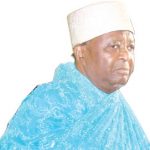C ONTROVERSY has trailed the Police Service Commission’s retirement of 21 Assistant Inspectors General of Police who were senior to or mates of the new acting Inspector General of Police, Idris Ibrahim, before his appointment. This was not the first time massive retirement was carried out in the top hierarchy of the police following the appointment of an IGP. As stated by chairman, Police Service Commission (PSC), Mike Okiro, a retired IGP, “When Alhaji Muhammadu Gambo was appointed IGP, he was a DIG, so there were no retirements. When Aliyu Attah was appointed, he was an AIG, so all the DIGs were retired. Tafa Balogun came in as AIG; all the senior officers were retired. Hafiz Ringim came in as AIG, all the DIG’s were retired. M.D. Abubakar came in as AIG, all the DIGs were retired. Ehindero, I and Ogbonna Onovo were DIGs, there were no retirements. IGP Solomon Arase was a DIG before taking over, so there were no retirements. Now that Ibrahim Idris has taken over, he should be allowed to work.”
Okiro emphasised that the Federal Government contravened neither the Police Act nor the constitution in approving the controversial retirements. Indeed, Okiro is right in emphasising the fact that such retirement is part of an emerging tradition. It is observed in the military and para-military organisations as well. The main justification for carrying out these retirements is the need to give a free hand to a new IGP to effectively command the force. It is believed that retaining his peers or superiors would create problems of compliance and effective control of the force.
However, the huge number of officers involved in the latest retirement exercise informed the controversy surrounding it. At least 21 top ranking officers were retired. Not a few believe that these officers still have a lot to contribute to the force before they reach the retirement age. Furthermore, some of the officers have shown willingness to continue to serve the country by challenging the retirement in court. We believe that such retirements are not necessary. This is because once an officer is appointed IGP, he takes effective charge by the very fact of the powers reposed in that office by the constitution and the Police Act.
Effective control cannot be dependent on the retention or retirement of an IGP’s previous superiors or peers. Indeed, by being appointed IGP, he or she automatically becomes superior in rank to those officers. Besides, those who are not disposed to taking orders from a new IGP because he or she was previously their inferior are more likely to retire voluntarily than suffer the consequences of insubordination and indiscipline. Besides, it can safely be assumed that any officer that elects to stay until retirement age following the appointment of a hitherto inferior officer as IGP has elected to continue to subject himself or herself to the discipline of the force.
It seems there is a problem with the process of appointment of IGPs from the rank below those of DIGs. Appointing the IGP from the rank of AIGs and below gives the impression that the president or the PSC did not find any officer in the rank of DIG appointable. This is unfortunate, because an officer who does not meet the requisite skills, knowledge and experience of a DIG should not be so promoted in the first place. The constitutional and legal provisions which allow the president to appoint the IGP from any rank in the force need to be revisited. It is these provisions that have allowed this wasteful tradition to thrive.
In 2012, civil society organisations called for the amendment of Section 215(1) of the constitution. This section provides that the IGP “shall be appointed by the President on the advice of the Police Council from amongst serving members of the Nigeria Police Force.” It does not provide for competence and other requirements for the appointment. This means that an officer of any rank can be appointed IGP. The constitution, the Police Act, and the Police Regulations fail to elaborate on the procedure for the appointment of an IGP and for other leadership positions in the NPF. Experience shows that appointments into leadership positions within the NPF have been largely determined by seniority and representation, influenced by nepotism, political patronage and regime interests and preferences. These have had adverse effects on management and leadership development in the NPF.
We believe that making the process more predictable by taking seniority into account will also help. Indeed, massive retirement of officers in the NPF, the military and other paramilitary organisations is tantamount to a monumental waste of resources. The country is deprived of the knowledge, skills and experience of these officers. The investment in their training is therefore not optimally utilised. Furthermore, government has to pay gratuities to such officers prematurely. In general, this tradition of retirements is a great drain on public resources. It should be discontinued.
WATCH TOP VIDEOS FROM NIGERIAN TRIBUNE TV
- Relationship Hangout: Public vs Private Proposals – Which Truly Wins in Love?
- “No” Is a Complete Sentence: Why You Should Stop Feeling Guilty
- Relationship Hangout: Friendship Talk 2025 – How to Be a Good Friend & Big Questions on Friendship
- Police Overpower Armed Robbers in Ibadan After Fierce Struggle





